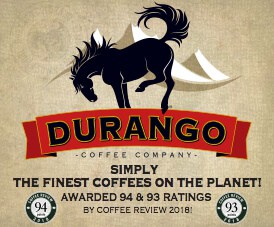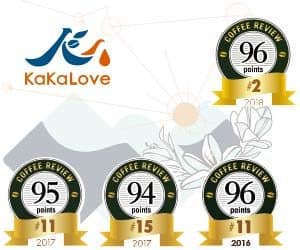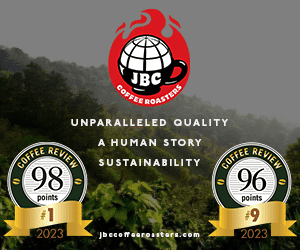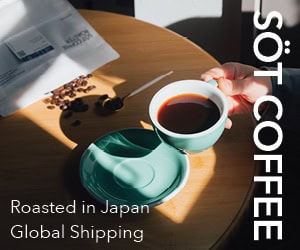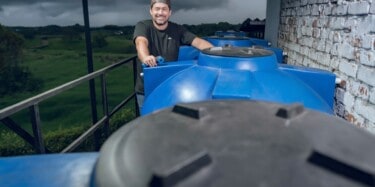Produced at Noelani Farm, entirely of the K7 variety of Arabica, and processed by the traditional washed method (fruit skin and pulp removed before drying). Paradise prides itself on quality and freshness, craft-roasting coffees in small batches only after orders are placed. Visit paradiseroasters.com or call 763-433-0626 for more information.
SEARCH RESULTS
Espresso Classico
A blend of Arabica coffees from Brazil, Thailand, and Nicaragua, and a Robusta from Ecuador, roasted for espresso applications. Paradise prides itself on quality and freshness, craft-roasting coffees in small batches only after orders are placed. Visit paradiseroasters.com or call 763-433-0626 for more information.
Ka‘ū Malolactic Natural
Produced by JN Farms from trees of the Red Bourbon variety of Arabica, and processed by a malolactic fermentation method designed by Miguel Meza, in which whole fruit is inoculated with both yeasts and malolactic bacteria, then fermented in anaerobic conditions for about a week before being dried in the whole fruit. Paradise prides itself on quality and freshness, craft-roasting coffees in small
Kona Classic
Produced by Armando and Karina Rodriguez of Aloha Star Farm, entirely of the Typica variety of Arabica. This is a blend of coffees from Typica variety trees processed by two different methods: traditional washed (fruit skin and pulp are removed before drying) and honey-processed (some fruit flesh is left on the bean during drying). Paradise prides itself on quality and freshness, craft-roasting
Hawai’i Ka‘ū Champagne Natural
A blend of coffees from Miranda Farms and JN Farms, from trees of the Red Catuai, Red Bourbon, Typica and Yellow Caturra varieties of Arabica, and processed by a proprietary method called “champagne natural,” in which fermentation using a wine yeast strain is applied to the whole fruit before it is dried. Paradise prides itself on quality and freshness, craft-roasting coffees in small batches only
Ecuador Legrand Robusta Lactic Natural Espresso
Produced by Denise Bustamonte, entirely of the Robusta species, and processed by anaerobic natural method, in which whole fruit is fermented in tanks with limited oxygen before drying, also in the whole fruit. In this case, lactic acid was added to the fermentation step. Paradise prides itself on quality and freshness, craft-roasting coffees in small batches only after orders are placed. Visit
Ka‘ū JN Farms Malolactic Honey
Produced by JN Farms from trees of the Red Bourbon variety of Arabica, and processed by a malolactic fermentation method designed by Miguel Meza, in which whole fruit is inoculated with both yeasts and malolactic bacteria, then fermented in anaerobic conditions for about a week before fruit and pulp are removed and the beans are dried in the fruit flesh or mucilage. Paradise prides itself on
Fresh Fruit or “Juicy Fruit”? Tasting 90 Anaerobic-Processed Coffees
Of all of the innovations challenging traditional expectations in specialty coffee today, the use of anaerobic (limited oxygen) fermentation to alter and intensify the character of the cup is perhaps the most striking. Anaerobic-fermented coffees that explicitly and successfully express this method tend to be intense and almost shockingly floral and fruit-toned, with the flowers often
Colombia Granja Paraíso-92- Papayo Kōji
Produced by Wilton Benitez entirely of the Papayo variety of Arabica. Processed by the kōji method, in which the coffee fruit is first sterilized and then fermented in a bio-reactor and inoculated with a selection of Japanese kōji (Aspergillus oryzae). This mold species breaks down starch into simple sugars and is commonly used in the production of soy sauce, miso, sake and shōchū. After
Ka‘u Red Catuai Peaberry
Produced at Miranda Farms entirely of the Red Catuai variety of Arabica, and processed by the traditional washed method. Paradise prides itself on quality and freshness, craft-roasting coffees in small batches only after orders are placed. Visit www.paradiseroasters.com or call 763-433-0626 for more information.
Colombia Granja Paraíso Java P14
Produced by Wilton Benitez of Finca El Paraíso entirely of the Java variety of Arabica, and processed by a complex double-anaerobic washed method, in which the coffee fruit is first sterilized, then fermented in the whole fruit in a bio-reactor and inoculated with Saccromyces cervesiae var. Diastaticus. (Strains from this yeast variety are commonly used in producing Saison style beers.) After
Colombia Granja Paraiso Decaf
Produced at Granja Paraiso entirely of the Colombia variety of Arabica, and processed by the traditional washed method with Saccromyces Pastorianus yeast added during the ferment step. Decaffeinated at origin in Colombia using ethyl acetate, an organic compound derived from sugar cane. Paradise prides itself on quality and freshness, craft-roasting coffees in small batches only after orders are
Philippines Sitio San Roque Robusta Anaerobic Natural
Produced by smallholding farmers near the Kalsada Sitio San Roque mill entirely of the Robusta species, and processed by the anaerobic natural method, in which whole fruit is fermented with limited oxygen before drying, still in the whole fruit. Paradise prides itself on quality and freshness, craft-roasting coffees in small batches only after orders are placed. Visit www.paradiseroasters.com or
Ka’u Tropical Punch
Produced by smallholding farmers and processed by the washed method with the addition of cultured yeasts during the fermentation step. Paradise prides itself on quality and freshness, craft-roasting coffees in small batches only after orders are placed. Visit www.paradiseroasters.com or call 763-433-0626 for more information.
An In-Depth Look at the Top 30 Coffees of 2022
In 2022, Coffee Review blind-tasted more than 2,500 samples from leading roasting companies and coffee producers, 530 of which we reviewed on www.coffeereview.com. The Top 30 Coffees of 2022 represents a further selection: a ranking of the 30 most exciting of these coffees. This year’s list represents the 10th year we have compiled our Top 30 list of the most exciting coffees we have tasted
Ethiopia Hamasho Washed
Produced by smallholding farmers from trees of the 74110, 74112 and other local varieties of Arabica long grown in the region, and processed by the traditional washed method (fruit skin and pulp are removed before drying) at Daye Bensa Washing Station. Paradise prides itself on quality and freshness, craft-roasting coffees in small batches only after orders are placed. Visit
Ethiopia Idido Anaerobic Natural
Produced by small-holding farmers largely from trees of selections of indigenous landrace varieties of Arabica long grown in the region, and processed by the anaerobic natural method, in which the whole fruit is fermented in an oxygen-free environment before drying. Paradise prides itself on quality and freshness, craft-roasting coffees in small batches only after orders are placed. Visit
Ka‘ū Champagne Natural Half-Caf
A blend of Typica, Red Bourbon and Red Catuai varieties of Arabica produced by Miranda Farms and JN Farms, processed using a proprietary method involving wine yeasts. The decaffeinated coffees were processed by Kona Decaf in Holualoa using pressurized carbon dioxide gas rather than chemical solvents to remove about 50% of the total caffeine, making this a “half-caf” coffee rather than a coffee
Espresso Nuevo
A blend of Arabica coffees from Thailand, Vietnam and Latin America designed as a dark-end-of-medium espresso ideal for milk drinks. Paradise prides itself on quality and freshness, craft-roasting coffees in small batches only after orders are placed. Visit www.paradiseroasters.com or call 763-433-0626 for more information.
Vietnam Robusta Carbonic Maceration
Produced by Toi Nguyen of Future Coffee Farm entirely of coffee of the Robusta species. Processed by the carbonic maceration method, which involves fermenting whole coffee fruit inside a sealed container that has been flushed with CO2, then drying the coffee, still in the whole fruit. Paradise prides itself on quality and freshness, craft-roasting coffees in small batches only after orders are


